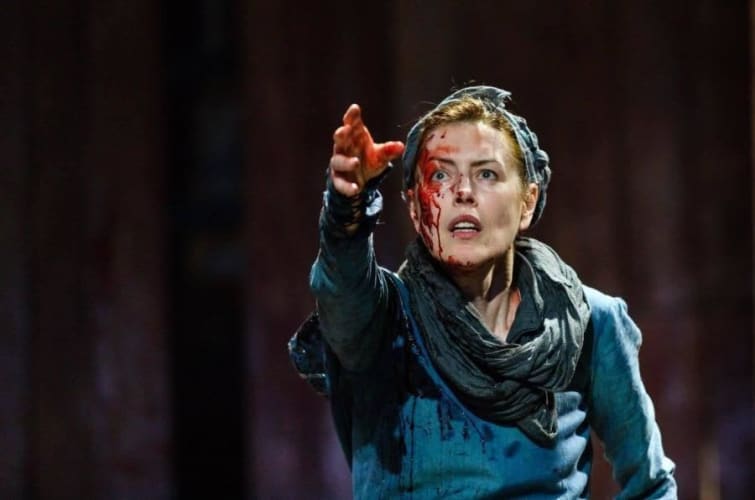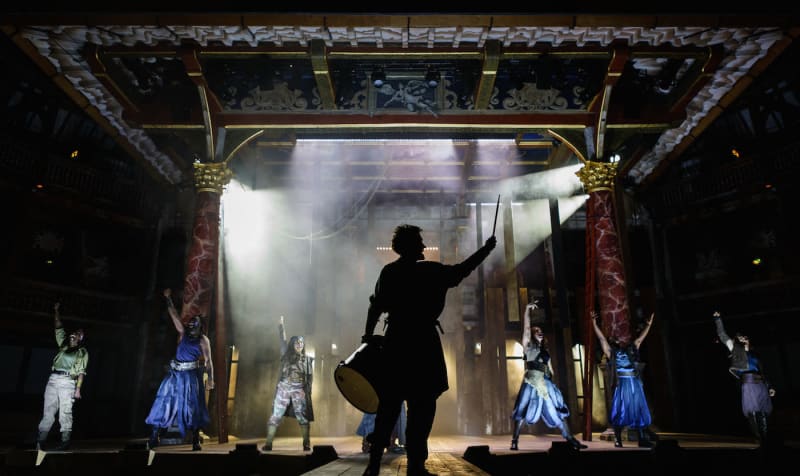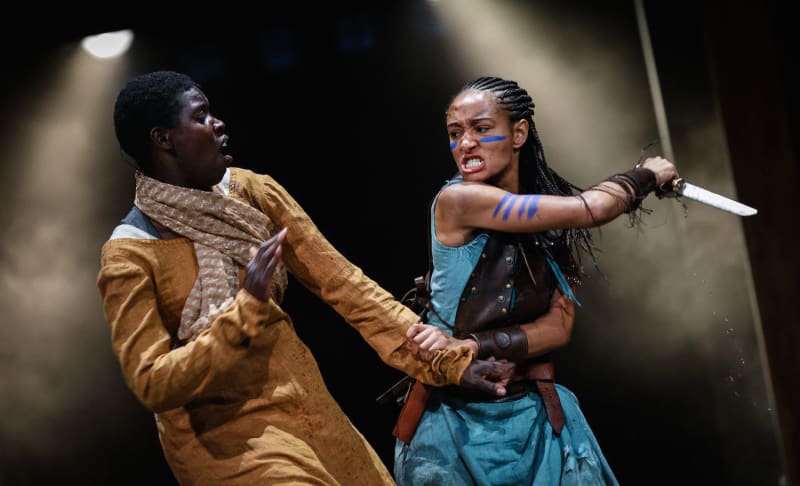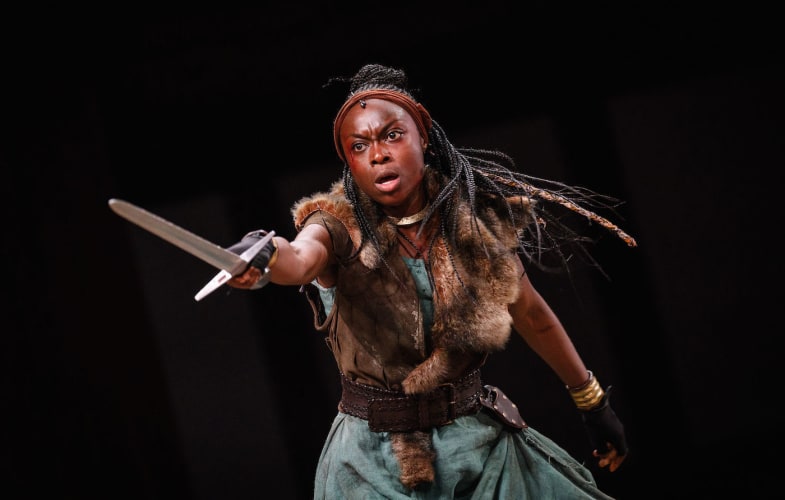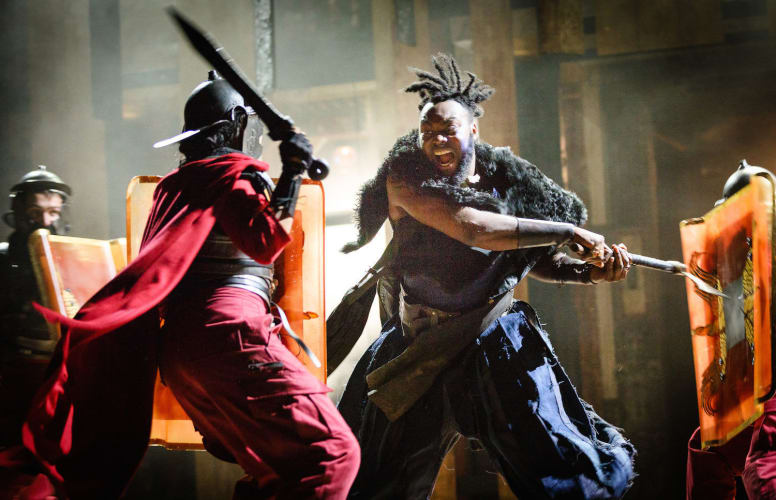Boudica was a 1st-century Celtic queen of the Iceni—the Victorians called her Boadicea and set her in bronze driving her chariot beside Parliament, Shakespeare’s colleagues Beaumont and Fletcher called her Bonduca when they wrote a play about her.
She is part of our British history, mentioned by Roman writers Tacitus and Cassius Dio, who described the rebellion when her army destroyed Camulodunum (Colchester) and burned down Londinium (London) and Verulamiam (St Albans), though their accounts don’t match. It used to be claimed that she was buried beneath a tumulus on Hampstead Heath—she wasn’t.
Few facts are known about her so Tristan Bernays has been free to create his own version of the story of what happened in 60-61AD when a British leader tried to withdraw from a European empire.
He presents us with an arrogant and hedonistic Roman Procurator, Catus Deciamus, who treats the native peoples as barbarians to be manipulated, a general, Seutonius, who sees himself as a soldier not a politician and a Rome that has made British leaders client kings.
One of them, Prasutagus, King of the Iceni (a tribe centred on East Anglia) has just died. The Procurator hosts a funeral feast with other kings in the Iceni Feast Hall. His estranged Queen Boudica turns up with her daughters claiming the kingdom that he left her, or rather half a kingdom, for he’d left the other half to the Emperor Nero.
Catus laughs at her effrontery. Women have no such rights under Roman law and Prasutagus was in debt to Rome: it is all theirs. Queen Boudica is whipped, her daughters given to Roman soldiers for their pleasure.
Boudica wants revenge as well as a kingdom; this is the blood-drenched telling of how she wreaked it until her luck changed.
Bernays tells it in verse. Though his Roman squaddies talk about sex in a coarse modern vernacular, he drops in frequent archaic forms of expression that make it feel at times like imitation Shakespeare. It would be more real without them, especially since in imagining the details of the story he reflects modern attitudes to gender roles and political manipulation. He doesn’t draw deliberate parallels but these kings are trapped by loans they can’t pay back, the children of the Roman veterans retired here have grown up seeing this as their homeland.
Once more, the Globe’s renaissance scena has been hidden. Director Eleanor Rode and her designer Tom Piper have boarded it over but this is not to hide it. The planks become a Roman palisade, which the British break through, an integral part of the visual staging, which reflects drama rather than history.
High status Romans who are not soldiers wear brocaded tunics instead of togas, an assault may be made abseiling or on zip wires, a hunt through a dark forest lit not by flares but electric torches. Casting is gender- and colour-blind, not just reflecting the fact that the Roman army was recruited from all parts of the empire.
The play seems to be called up by a bandana-wearing woman (Anna-Maria Nabirye) who could be a Cuban revolutionary leading into a movement-based beginning. It has a ritual-like feeling and she may be the Iceni goddess Andraste who descends from heaven later wearing a space helmet.
Movement director Glyn Macdonald, fight directors Rachel Bown-Williams and Ruth Cooper-Brown and choreographer Tom Jackson Greaves make a major contribution, with violent though stylized combat and frantic dances borrowing songs from The Clash (though Forbes Masson’s delightfully human King Cunobeline—Shakespeare’s Cymbeline—is perhaps a touch too jokey, the audience seem to love it).
Central is Gina McKee’s Boudica, a performance of authority and controlled feeling that sometimes bursts out. It comes close to making you understand her savage taking of revenge. Indeed, after her treatment by Samuel Collings’s petulant Catus Deciamus, it is not surprising, but, while her impetuous daughter Blodwynn (Natalie Simpson) is all action, her more thoughtful sister Alonna (Joan Iyiola) has compassion for the innocents they slaughter simply because they are Roman.
Clifford Samuel makes Seutonius one of those upright soldiers who shows respect for the enemy even while avoiding moral judgement, a kind of opposition figure to Boudica who refuses to budge from her decisions.
This is a strong company that delivers the drama with an excitement that seems more like myth and magic fantasy than history, which emphasises the swashbuckling and the colour rather than the lives lost. At varies times, it spreads itself right through the theatre and is a production that truly needs Malcolm Rippeth’s lighting.
Quite how the play fits into the season’s “Summer of Love” theme I’m not sure. Is this about the love between mother and daughters, about love of country or of equal rights? It tells a story, a story of women, that is one of the first to come down from Britain’s earliest history—and tells it well.
